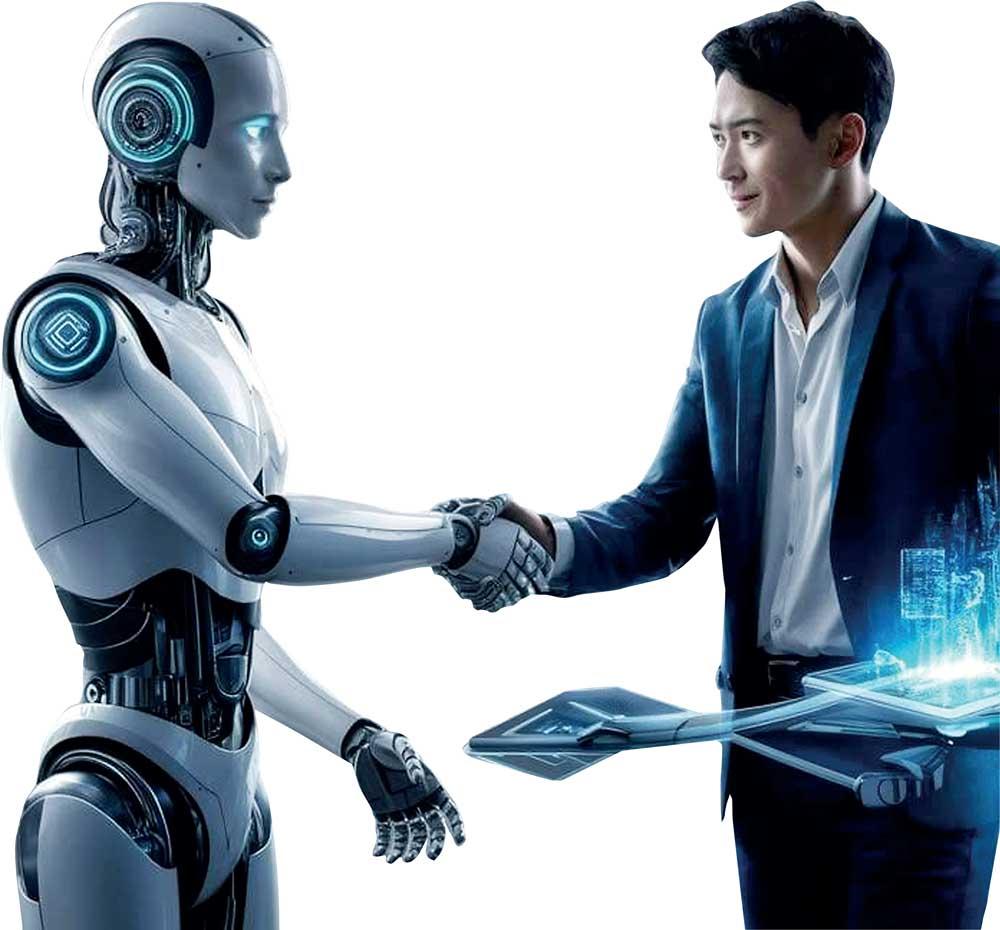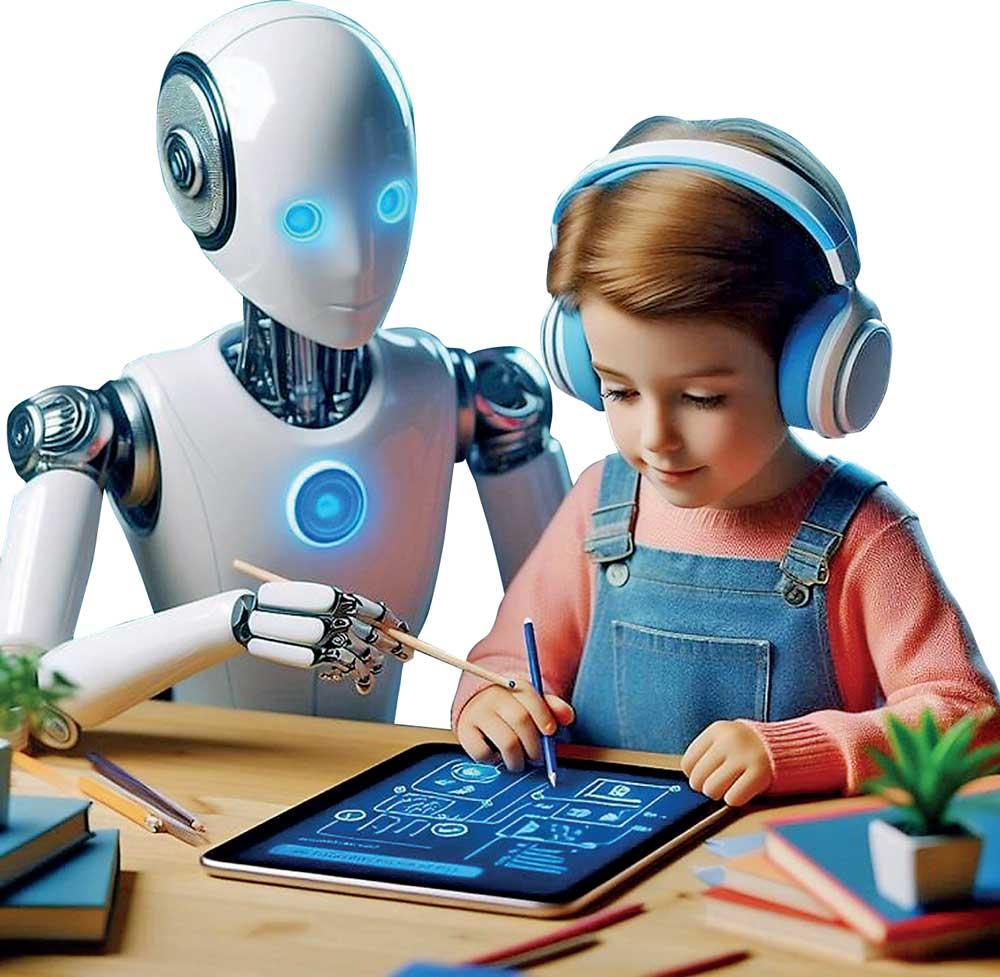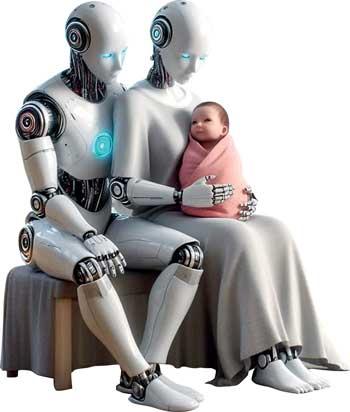

- Privacy and data security concerns are also at the forefront of the AI debate. AI systems rely on vast amounts of data, raising concerns about privacy and potential misuse. Stricter regulations and robust data protection measures are needed to ensure that AI-driven platforms respect users' data rights and maintain their trust.
 01.Artificial Intelligence (AI) refers to the creation of computer systems capable of performing tasks that usually require human intelligence, such as learning, problem-solving, reasoning, perception, and understanding language.
01.Artificial Intelligence (AI) refers to the creation of computer systems capable of performing tasks that usually require human intelligence, such as learning, problem-solving, reasoning, perception, and understanding language.
AI is widely used in daily life through virtual assistants like Siri, Google Assistant, and Alexa; image recognition tools in Facebook and Google Photos; and chatbots used for customer service on websites and messaging platforms. It also powers self-driving car technologies like Tesla’s Autopilot and Waymo, as well as language translation tools such as Google Translate. Additionally, AI supports predictive analytics in platforms like Netflix, Amazon, and financial services. There are two main types of AI: narrow or weak AI, which is task-specific, and general or strong AI, which is a more advanced, hypothetical form capable of human-level reasoning. AI continues to transform industries such as healthcare, finance, and transportation by increasing efficiency, accuracy, and innovation.
02.Artificial intelligence is transforming the way we connect and communicate. With advancements in emotional AI, machines are being designed to understand and respond to human feelings, raising questions about their ability to truly empathize. Social robots like Pepper and JAibo are entering homes, schools, and care facilities, changing the dynamic between humans and machines. AI-powered virtual companions are becoming more common, offering emotional support and interaction, especially for those facing loneliness. Additionally, human-AI collaboration is enhancing productivity and decision-making across various sectors, from healthcare to education. However, as people begin to form emotional attachments to AI entities, ethical concerns arise about dependency, privacy, and the authenticity of such relationships. These developments present a complex yet fascinating future, where technology doesn't just serve us—but interacts with us on a deeply human level.
The future of artificial intelligence (AI) is unfolding at an unprecedented pace, bringing forth transformative advancements across multiple sectors. On the trend front, generative AI models such as ChatGPT, DALL-E, and Midjourney are pioneering a revolution in content creation, image generation, and coding. These models are not only enhancing the efficiency of creative tasks but also producing highly realistic content, thereby opening new avenues for businesses to automate and innovate. In healthcare, AI-driven diagnostics and predictive analytics are setting new standards in medical care. AI-powered algorithms are becoming indispensable tools for doctors, enabling early disease detection, personalized treatment plans, and accurate predictions of patient outcomes. This integration of AI in healthcare promises to save lives and improve the quality of medical services.
03.n the realm of transportation and logistics, autonomous systems such as self-driving cars, delivery drones, and robotic systems are poised to redefine the industry. AI will play a crucial role in making these systems safer, more efficient, and reliable, thereby reducing accidents and improving delivery times. Cybersecurity is another area where AI is making significant strides. AI-driven security tools are now capable of analyzing patterns, predicting vulnerabilities, and enhancing real-time threat detection.
This proactive approach to cybersecurity will be vital in protecting sensitive data and systems from increasingly sophisticated cyber threats. Furthermore, embodied AI and robotics are expected to become more prevalent in industries like manufacturing, healthcare, and logistics. AI-powered robots will not only enhance productivity but also perform tasks that are dangerous or difficult for humans.
However, the rapid advancement of AI also brings forth several challenges that need to be addressed. One of the most pressing concerns is job displacement and its economic impact. As AI-powered automation becomes more widespread, traditional jobs in industries such as manufacturing, customer service, and data analysis are at risk. To mitigate this, reskilling the workforce will be crucial. Ensuring that workers have the necessary skills to adapt to an AI-driven economy will be essential for minimizing the negative impacts of job displacement. Another significant challenge is bias and fairness in AI. AI models often inherit biases from the data they are trained on, leading to unfair and discriminatory outcomes. Addressing algorithmic bias and ensuring fairness in AI applications is not just a technical challenge but a moral imperative.
 04.Privacy and data security concerns are also at the forefront of the AI debate. AI systems rely on vast amounts of data, raising concerns about privacy and potential misuse. Stricter regulations and robust data protection measures are needed to ensure that AI-driven platforms respect users' data rights and maintain their trust. Environmental concerns are another critical aspect that cannot be overlooked. The computational power required for AI models consumes significant energy, contributing to environmental degradation. Balancing AI's benefits with sustainability goals will be an ongoing priority for developers and policymakers alike. Lastly, the regulatory lag in AI development is a significant challenge. Governments worldwide are struggling to keep pace with AI's rapid development, and clear policies around AI accountability, safety, and usage are critical for shaping a responsible future.
04.Privacy and data security concerns are also at the forefront of the AI debate. AI systems rely on vast amounts of data, raising concerns about privacy and potential misuse. Stricter regulations and robust data protection measures are needed to ensure that AI-driven platforms respect users' data rights and maintain their trust. Environmental concerns are another critical aspect that cannot be overlooked. The computational power required for AI models consumes significant energy, contributing to environmental degradation. Balancing AI's benefits with sustainability goals will be an ongoing priority for developers and policymakers alike. Lastly, the regulatory lag in AI development is a significant challenge. Governments worldwide are struggling to keep pace with AI's rapid development, and clear policies around AI accountability, safety, and usage are critical for shaping a responsible future.
AI continues to advance, it is essential to address these challenges proactively. By understanding the trends and challenges shaping the future of AI, we can harness its potential to drive innovation, improve lives, and create a better future for humanity. The journey ahead will require collaboration, foresight, and a commitment to ensuring that AI development benefits everyone.











